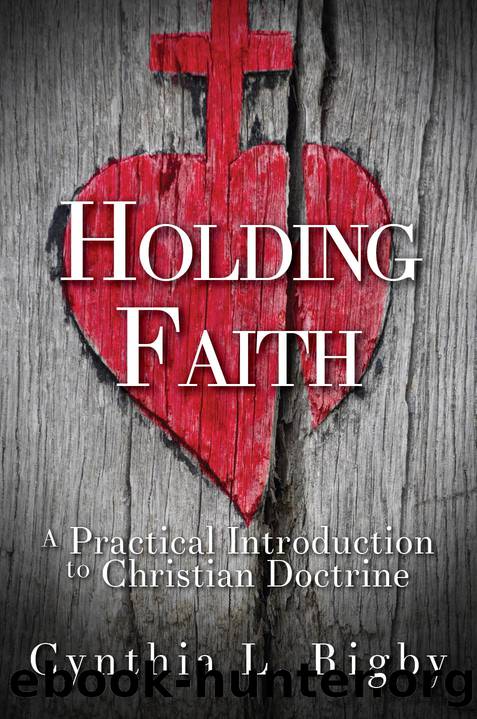Holding Faith by Rigby Cynthia L.;

Author:Rigby, Cynthia L.;
Language: eng
Format: epub
Publisher: Abingdon Press
Published: 2018-08-15T00:00:00+00:00
EVIL AS NOT GOOD AND SIN AS ABERRATION
All of this might sound, at this point, like a bit of a fairy tale. After all, the fact of Godâs intimate relationship with nature is often far from apparent. Just a few moments ago my middle-schoolâage son looked over my shoulder, read a few of the preceding paragraphs, and said, âMommy, you know what saying I donât like, that we say in church? âGod is good, all the time. All the time, God is good.â What in the world does that mean, Mommy, when so many bad things happen in the world?â
Exactly the question we all have. Once we say that everything that exists is good because it was created by a good God out of nothing, it might seem difficult (perhaps impossible) to explain why and how there is so much that is not good. It is so difficult, in fact, and the pressure to account for suffering so great, that we wind up adjusting to account for the seeming discrepancy between what we claim about God and Godâs creation and the problematic things that are in evidence all around us. We might assert, given Godâs sovereignty and goodness, that things canât be as bad as they seem.52 Or we might conclude, given the depths of the worldâs suffering, that God is not as powerful as we may have thought; perhaps God âcannot do everything.â53 Or perhaps God is not altogether good,54 creating us with flaws that have to be navigated. The problem with any and all of these âsolutionsâ to the problem of suffering is that they set aside the promise of creationâthat God makes us and meets us, wholly good and perfectly present. In Genesis, as we have said, this utter goodness is emphasized, and God is present in our midst, walking in the Garden. When sin enters the story, it is viewed as an aberration and adulteration, utterly inconsistent with what God has made, what God desires, and what God intends.
There is a way, however, of accounting for the suffering of the world without compromising on the goodness of either God or creation. Augustine got at it by asking (after affirming the goodness of creation as made by the good and singular God): Then where did evil come from? Augustine recognized that he could posit neither that evil was made by God nor that it was made by one other than God without running into theological difficulties. He struggled to find another response to the problem and finally arrived at what has ever since been a defining way theologians have framed evil and sin. What approach did Augustine take?
Augustineâs brilliant solution to the dilemma of how to account for suffering in the face of the created goodness is to define evil as âthe absence of good.â55 Evil has no substance, he argues. It was not created. It could not have been created, he thinks, since everything that was created is good. Evil, he thinks, is the antithesis of the good creation.
Download
This site does not store any files on its server. We only index and link to content provided by other sites. Please contact the content providers to delete copyright contents if any and email us, we'll remove relevant links or contents immediately.
Signature in the Cell: DNA and the Evidence for Intelligent Design by Stephen C. Meyer(2875)
Real Sex by Lauren F. Winner(2861)
The Holy Spirit by Billy Graham(2775)
The Secret Power of Speaking God's Word by Joyce Meyer(2750)
The Gnostic Gospels by Pagels Elaine(2393)
Jesus by Paul Johnson(2224)
Devil, The by Almond Philip C(2203)
23:27 by H. L. Roberts(2141)
The Nativity by Geza Vermes(2113)
Chosen by God by R. C. Sproul(2053)
All Things New by John Eldredge(2051)
Angels of God: The Bible, the Church and the Heavenly Hosts by Mike Aquilina(1867)
Angels by Billy Graham(1843)
The Return of the Gods by Erich von Daniken(1839)
Knowing God by J.I. Packer(1723)
Jesus of Nazareth by Joseph Ratzinger(1705)
Evidence of the Afterlife by Jeffrey Long(1704)
The Gnostic Gospel of St. Thomas by Tau Malachi(1677)
How To Be Born Again by Billy Graham(1668)
